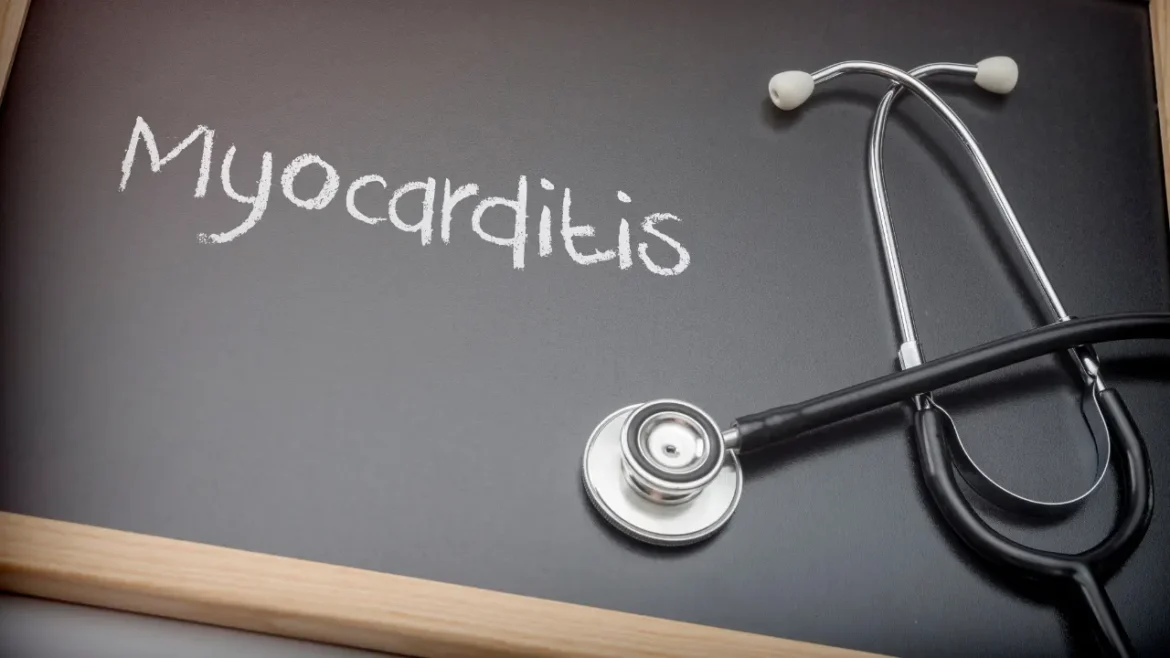Description
The inflammatory condition known as Autoimmune Myocarditis impacts the myocardium, the heart’s muscular layer. Whenever a person’s immune system accidentally targets their heart tissue, it can cause inflammation and perhaps permanent damage. Due to the possibility of abrupt cardiac death or heart failure, Autoimmune Myocarditis may be life-threatening to anyone with it.
The symptoms of Autoimmune Myocarditis frequently resemble those of other heart-related disorders, making a precise diagnosis difficult. Chest pain, breathlessness, exhaustion, an irregular heartbeat, or arrhythmia, as well as swollen ankles and legs are typical symptoms of Autoimmune Myocarditis. In addition to the aforementioned of Autoimmune Myocarditis, some people with it may exhibit signs of the flu, including fever and pain in their bodies. A health history, physical checkup, imaging tests like cardiac MRI and echocardiogram, along with heart biopsies for confirmation of inflammation are frequently used in the diagnosis process of Autoimmune Myocarditis.
You May Also Like:
5 GREAT WAYS TO REDUCE STRESS AND ELEVATE MOOD WITHOUT ALCOHOL
OLLY GOODBYE STRESS GUMMIES REVIEWED: A LEADING STRESS RELIEF PRODUCT
Autoimmune Myocarditis: Description, Causes, And Treatment Protocol is an original (HealthXWire) article.
Possible Causes
Viral infections, like enteroviruses and adenoviruses, most frequently cause Autoimmune Myocarditis. The immune system’s reaction to these infections may be improperly focused, resulting in inflammation and heart muscle damage. Because some people may be more susceptible to developing autoimmune disorders than others, scientists and medical specialists hypothesize that genetic predisposition is a significant factor in the prevalence of Autoimmune Myocarditis.
Additionally, environmental stimuli, such as exposure to poisons or chemicals, may interact with hereditary variables to cause an immunological reaction to heart tissue. There is potential for a higher risk of Autoimmune Myocarditis in people who already have autoimmune diseases including Rheumatoid Arthritis or Systemic Lupus Erythematosus (SLE). Inflammation of the cardiac tissue may be a result of the underlying immunological dysregulation of these disorders.
Exacerbating and Mitigating Factors
The development and treatment of Autoimmune Myocarditis depend heavily on various factors.
Exacerbating Factors:
Poorly Controlled Infections: The risk of developing Autoimmune Myocarditis can rise as a result of delayed diagnosis and ineffective treatment of viral infections.
Viral Infections: The main cause of Autoimmune Myocarditis is viral infections, especially enteroviruses and adenoviruses. This autoimmune disorder causes the body to inadvertently attack the heart muscle while the immune system launches a defense against the virus that might result in inflammation and injury.
Genetic Predisposition: Certain people are genetically predisposed to autoimmune conditions like Myocarditis. The likelihood of developing an immune system dysfunction that attacks cardiac tissue may be increased by specific hereditary variables. Knowledge of these variable can help you and your health care providers with respect to your treatment and recovery.
Environmental Triggers: Autoimmune Myocarditis may be brought on by exposure to specific environmental pollutants, chemicals, or stresses. Environmental variables may mix with genetic predispositions to cause an immunological reaction against the heart, even though the precise triggers are yet unknown.
Immune System Dysregulation: Immune deficiencies or autoimmune illnesses may raise the risk of developing Autoimmune Myocarditis. These conditions might induce an immune system imbalance or dysregulation.
Medications: Particular medications, including some antibiotics or other medicines, may, in some people, cause an immunological reaction that results in Myocarditis.
Stress and Anxiety: Chronic anxiety and stress may weaken the body’s immune system and aggravate autoimmune illnesses, like Myocarditis.
Other Underlying Medical Issues: Autoimmune Myocarditis risk might be raised by pre-existing medical problems including Lupus, Rheumatoid Arthritis, or other autoimmune diseases.
Mitigating Factors:
Avoiding Environmental Triggers: By limiting exposure to probable triggers and environmental pollutants, Autoimmune Myocarditis may develop less frequently.
Early Detection and Treatment: To lessen the severity and advancement of Autoimmune Myocarditis, early identification and therapy are essential. Immunosuppressive medicines can be used early on to modulate the immune system and decrease inflammation.
Medication Adherence: Effective management of Autoimmune Myocarditis depends on proper adherence to recommended medications, particularly immunosuppressive treatments.
Lifestyle Modifications: Maintaining a healthy lifestyle, like a balanced diet, frequent exercise, and stress-reduction measures, may improve the immune system and general heart health.
Supportive Care: When Myocarditis is acute, getting enough sleep and staying hydrated might help the heart heal.
Vaccinations: Having up-to-date vaccines may help lower the incidence of viral-induced Myocarditis, particularly for avoidable viral illnesses.
Compliance with Treatment Strategy: The successful therapy of Autoimmune Myocarditis depends on adhering to the recommended treatment plan and showing up for follow-up consultations.
Consistent Follow-Up Visits: Periodic examinations and follow-up sessions with medical professionals enable careful tracking of the disease’s development and sensible modifications to the treatment strategy.

Standard Treatment Protocol
In order to reduce inflammation, manage symptoms, and avoid complications, Autoimmune Myocarditis is commonly treated with a combination of pharmaceuticals and forms of supportive care. The following is the recommended course of action for Autoimmune Myocarditis:
Immunosuppressive Medications: To control the hyperactive immune response and lessen inflammation in the heart muscle, doctors frequently administer corticosteroids and immunosuppressive medications. These drugs assist in symptom relief and halt future myocardial deterioration.
Antiviral Agents: Antiviral drugs are often recommended to treat the underlying illness and stop additional viral replication if a viral infection caused the Myocarditis.
Heart Failure Management: Particular drugs are utilized to enhance heart function and lessen the burden on the heart in cases when Autoimmune Myocarditis results in heart failure. Angiotensin Receptor Blockers (ARBs), Angiotensin-Converting Enzyme (ACE) inhibitors and diuretics are some of the most often recommended drugs for heart failure. These drugs assist control blood pressure, lessen fluid retention, and enhance the heart’s capacity to pump blood efficiently.
Supportive Care: The most crucial aspects of supportive care are rest and hydration. Hospitalization can be required to carefully monitor the patient’s status in extreme circumstances.


Treatment Options
While there is normal treatment plan that is the cornerstone for treating Autoimmune Myocarditis, adjunct therapies, like dietary supplements, homeopathic cures, and complementary therapies, might be thought of as supplementary support to standard therapy. Adjunctive therapies include:
Nutritional Supplements:By boosting general wellness, lowering inflammation, and maintaining heart function, nutritional supplements may be used as adjuvant therapy for the treatment of Autoimmune Myocarditis. The following are possible dietary supplements:
- Vitamin C
Antioxidant vitamin C can assist the immune system and decrease oxidative stress. Consuming it might support the immune system and general heart health.
- Vitamin D
The risk of Myocarditis is raised in people who lack vitamin D. Inflammation may be decreased and the immune system may be regulated with adequate vitamin D levels. Sunlight exposure or supplementation both provide vitamin D.
- Vitamin E
Another antioxidant that can aid in preventing oxidative damage to cardiac cells is vitamin E.
- Omega-3 Fatty Acids
Docosahexaenoic Acid (DHA) and Eicosapentaenoic Acid (EPA), two omega-3 fatty acids, possess anti-inflammatory effects and may help lessen inflammation within the heart muscle. These can be derived via flaxseeds, as well as fatty fish such as mackerel, salmon, and sardines, along with fish oil supplements.
- Coenzyme Q10 (CoQ10)
Antioxidant CoQ10 is essential for the synthesis of energy in cardiac cells. CoQ10 supplementation may enhance heart health and lessen oxidative damage in Myocarditis.
- Magnesium
For a healthy heart and relaxed muscles, magnesium is necessary. Arrhythmias may be decreased and heart health may be supported through supplementation.
- Selenium
A trace mineral called selenium improves immunological health and is an antioxidant. It might lessen inflammation in people who have autoimmune diseases like Myocarditis.
- L-carnitine
An amino acid called L-carnitine is important for the energy metabolism of cardiac cells. Supplementation may enhance heart health and increase energy output.
Natural and Herbal Remedies: For those with Autoimmune Myocarditis, natural and herbal therapies may provide further help. Here are several herbal and natural treatments for Autoimmune Myocarditis that have been recommended:
- Garlic (Allium sativum)
The antioxidant and anti-inflammatory chemicals found in garlic may help to protect the heart and prevent inflammation.
- Hawthorn Berry (Crataegus spp.)
Traditional medicine has long used hawthorn extract to treat heart-related ailments. It could potentially improve blood flow and lower blood pressure, which could enhance heart health and have cardioprotective effects.
- Turmeric (Curcuma longa)
Curcumin, an active ingredient in turmeric, is highly effective at reducing inflammation. Curcumin might decrease oxidative stress and cardiac inflammation.
- Green Tea (Camellia sinensis)
Inflammation and oxidative stress in the heart may be mitigated by the polyphenols and antioxidants found in green tea.
- Reishi Mushroom (Ganoderma lucidum)
Traditional uses of reishi mushrooms include immune support and heart health. They possess bioactive substances that could have anti-inflammatory and cardiovascular benefits.
- Astragalus (Astragalus membranaceus)
The herb astragalus is well known for its capacity to modulate the immune system. In those with autoimmune disorders, it might lessen inflammation and aid in immune system regulation.
- Ginkgo Biloba
The plant ginkgo biloba is popular for its anti-inflammatory and antioxidant effects. It could assist in lowering cardiac inflammation and oxidative stress.
- Ginger (Zingiber officinale)
Ginger contains anti-inflammatory qualities that could reduce inflammation during Autoimmune Myocarditis.
The scientific evidence for the effectiveness of these natural and herbal treatments in managing Autoimmune Myocarditis is minimal, despite the fact that they appear to be promising. They should not be utilized in place of conventional medical treatments, but rather as supplemental therapies used under the supervision of healthcare practitioners. To ensure safe and proper integration with their medical regimen, people should let their healthcare professionals know about any natural treatments they intend to utilize.


Conclusion:
Autoimmune Myocarditis is a serious, yet treatable disease. It is possible to survive and live with autoimmune disorders nowadays. Survival depends on a variety of factors and can be helped with informed choices backed by research. Please take into consideration factors that affect your health presently and factors from your past that may also contribute to the prevalence and intensity of Autoimmune Myocarditis, such as your personal health history, as well as the health history of your ancestors.
There exists a body of research that asserts the benefits of both standard and alternative treatment plans of this disorder. Autoimmune Myocarditis affects one of the most important parts of the body and to your overall survival. Think carefully about how which treatment plans are best for you.


References:
1. “What is Autoimmune myocarditis.” Retrieved from: https://autoimmune.org/disease-information/Autoimmune-Myocarditis/
2. “Myocarditis.” Retrieved from: https://www.mayoclinic.org/diseases-conditions/Myocarditis/symptoms-causes/syc-20352539
3. “Autoimmunity in Acute Myocarditis: How Immunopathogenesis Steers New Directions for Diagnosis and Treatment.” Retrieved from: https://www.ncbi.nlm.nih.gov/pmc/articles/PMC7083821/
4. “Autoimmune myocarditis.” Retrieved from: https://www.internationaljournalofcardiology.com/article/0167-5273(96)02595-8/fulltext
Important Note: The information contained in this article is for general informational purposes only, and should not be construed as health or medical advice, nor is it intended to diagnose, prevent, treat, or cure any disease or health condition. Before embarking on any diet, fitness regimen, or program of nutritional supplementation, it is advisable to consult your healthcare professional in order to determine its safety and probable efficacy in terms of your individual state of health.
Regarding Nutritional Supplements Or Other Non-Prescription Health Products: If any nutritional supplements or other non-prescription health products are mentioned in the foregoing article, any claims or statements made about them have not been evaluated by the U.S. Food and Drug Administration, and such nutritional supplements or other health products are not intended to diagnose, treat, cure, or prevent any disease.
Table of Contents


